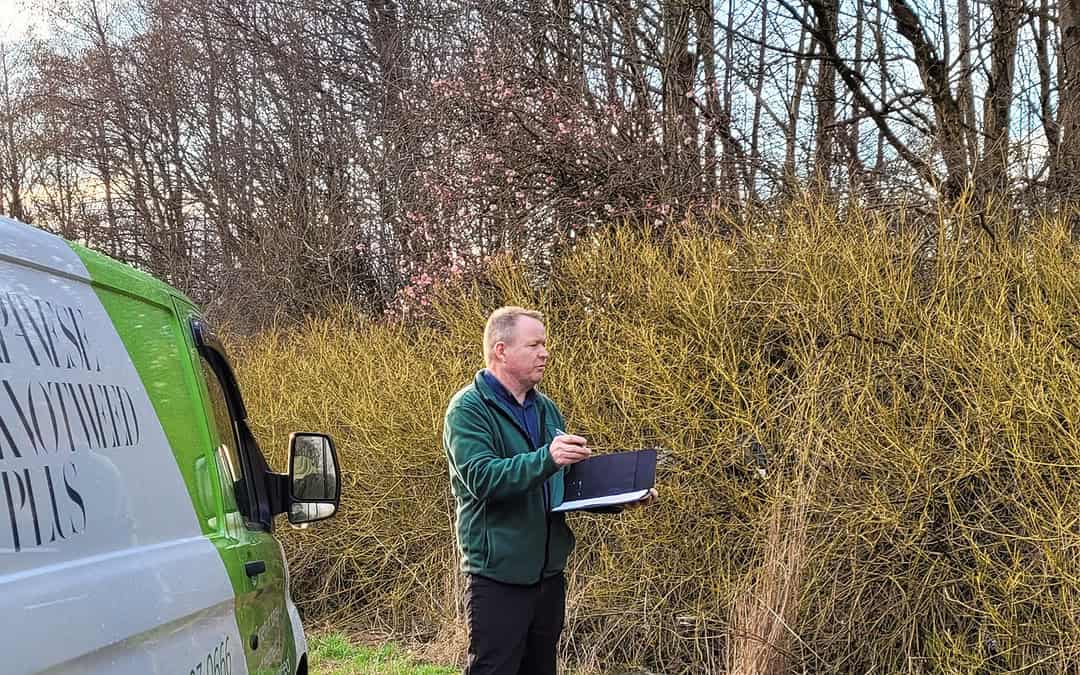Burying Japanese knotweed can lead to severe legal consequences.
This article provides insights into the laws governing the burial of Japanese knotweed in the UK and ways to dispose of it safely.
Japanese knotweed is an invasive plant species that can cause severe damage to buildings and infrastructure if left unchecked. It is illegal to let Japanese knotweed grow in the wild or allow it to spread to neighbouring properties. The plant is classified as controlled waste under the Environmental Protection Act 1990, and disposing of it can be a challenge. In this article, we will explore the question “Are you legally allowed to bury Japanese knotweed?” and provide insights into the laws governing the disposal of this invasive plant species.
Are you legally allowed to bury Japanese knotweed?
No, it is not legal to bury Japanese knotweed. The plant is classified as controlled waste, and burying it can lead to severe legal consequences. Under the Environmental Protection Act 1990, Japanese knotweed is classified as “controlled waste,” and it must be disposed of at authorized sites that are licensed to accept it. These sites include landfills that have the necessary permits to accept controlled waste.
Japanese knotweed – An Overview:
Japanese knotweed is a perennial plant species that originated in Japan and was introduced to the UK in the 19th century as an ornamental plant. The plant is now considered an invasive species that can cause significant damage to buildings and infrastructure. It can grow up to 3 meters tall and has a bamboo-like stem with broad green leaves. Japanese knotweed can spread quickly and is known to damage concrete, tarmac, and brickwork.
Laws governing the disposal of Japanese knotweed in the UK:
The Environmental Protection Act 1990 and the Wildlife and Countryside Act 1981 govern the disposal of Japanese knotweed in the UK. Under these laws, it is illegal to let the plant grow in the wild, and it must be disposed of at authorized sites that are licensed to accept it. The disposal of Japanese knotweed is subject to strict regulations, and failure to comply with these regulations can lead to severe legal consequences.
Why burying Japanese knotweed is illegal:
Burying Japanese knotweed is illegal because it can lead to the spread of the plant and cause significant damage to the environment. Japanese knotweed is known to spread through its root system, and burying it can lead to the growth of new plants in the surrounding soil. The plant is classified as controlled waste, and burying it can also contaminate the soil and groundwater.
What are the legal ways to dispose of Japanese knotweed?
There are several legal ways to dispose of Japanese knotweed. These include:
- Chemical treatment: Chemical treatment is the most common method used to control and dispose of Japanese knotweed. It involves the use of herbicides that kill the plant and prevent it from spreading.
- Excavation and removal: Excavation and removal involve digging up the plant and removing it from the site. The soil and plant material are then transported to a licensed landfill or incineration facility.
- Burial at an authorized landfill site: Japanese knotweed can be disposed of at licensed landfill sites that are authorized to accept controlled waste. The waste must be transported and disposed of in accordance with the regulations set out by the Environment Agency.
Burying Japanese knotweed can lead to severe legal consequences. The
The consequences of burying Japanese knotweed can include fines, legal action, and even imprisonment. If the buried knotweed contaminates the soil and groundwater, it can also lead to environmental damage and health risks. In addition, if you bury Japanese knotweed on someone else’s property without their permission, you could be liable for trespass and be required to pay damages.
FAQs:
Q: Can I burn Japanese knotweed?
A: No, burning Japanese knotweed is illegal and can lead to severe legal consequences. The plant is classified as controlled waste, and burning it can release harmful pollutants into the air.
Q: Can I compost Japanese knotweed?
A: No, it is not recommended to compost Japanese knotweed. The plant can survive in soil for up to 20 years, and composting may not kill the plant or its seeds.
Q: What should I do if I find Japanese knotweed on my property?
A: If you find Japanese knotweed on your property, you should contact a specialist in invasive plant removal to assess the situation and provide advice on the best course of action.
However burying Japanese knotweed is illegal and can lead to severe legal consequences. It is classified as controlled waste, and disposing of it requires strict compliance with regulations. The safest and legal ways to dispose of Japanese knotweed include chemical treatment, excavation and removal, and burial at licensed landfill sites. If you suspect Japanese knotweed on your property, contact a specialist in invasive plant removal to avoid potential legal and environmental problems.
